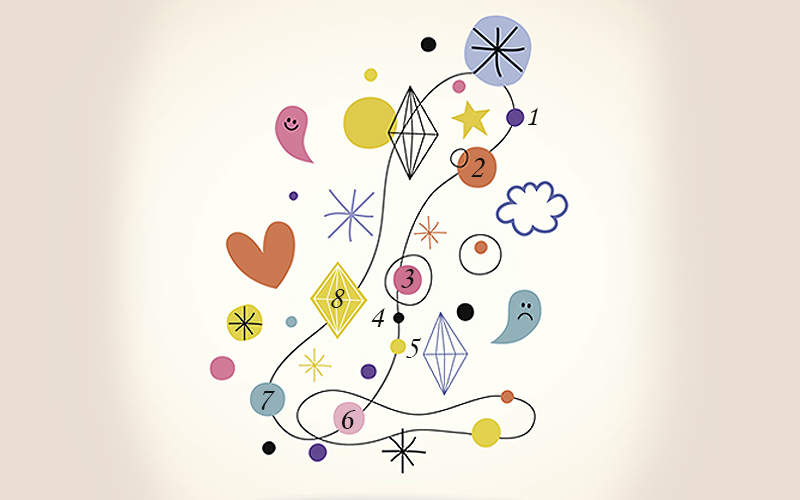
by guest blogger Renee James, humorist and blogger
Many years ago, when I was a single, young working woman, I had great affection for two comic strips that appeared in the newspaper*: Cathy, written by Cathy Guisewite, and Calvin and Hobbes, written by Bill Watterson. I often clipped and saved—how quaint!—my favorites and posted them in my office cubicle.
“Cathy” was a character living a life not unlike my own at the time. My affinity for the messages in Calvin and Hobbes was perhaps a bit more prescient: In the early ’90s, I would have three sons and often find myself perplexed at their point of view. Much as my kids eventually did, Calvin made me laugh, shake my head in bewildered amusement, and tear up over his adventures. As it turns out, he’s never really left my consciousness, and Hobbes, ever the voice of sanity, has seemed even wiser over the years. More about them later.
Picture this: Someone you love screwed up. He or she blew it. Who hasn’t? The person made a bad choice and now has a problem to resolve. Thing is, it’s not the first (or second or third) time this has happened, and you start to wonder if this is a hiccup or a habit.
The consequences of not following the “rules,” whether it stems from being irresponsible or from immaturity, addiction, or depression, can be devastating. For everyone. I’ll admit that rule breaking appears more thrilling, that many of us would rather be seen as artists than as accountants—it’s not creative or “badass” to tick off a to-do list. But rules make order. And order helps encourage creativity, doesn’t it? One of the reasons we can visit places like the Met and view breathtaking art is that the museum has a board and a group of people committed to following the rules when it comes to fund-raising and paying the bills that keep the lights on for the artists among us.
People much more informed and much more qualified than I have written thousands of words about the meaning and benefits of “tough love” and “letting someone fail” in order for change to take place, for them to move forward. It’s a lesson we were all taught as children, right? Break the rules or take a shortcut or try to get away with something, and inevitably, it won’t work. Or it won’t work for long, and things will start to unravel.
I’ve had those conversations; I’ve enjoined people I love to offer that kind of “tough” support to family and friends who need a wake-up call. I’ve been told to “toughen up,” too. “You’re not the safety net!” “He/she needs to learn what happens after a bad choice!” “Actions have consequences!” “Stop saving the day!”
Got it. I just can’t seem to do it.
The question is how do you stop yourself from becoming the person who always throws out a lifeline instead of being the person who helps someone learn how to swim? Put another way, how do you know when you’ve thrown that lifeline so many times it’s become a routine? Maybe if you toss it over and over and over again, no one can imagine staying afloat without it. Both actions do the same thing: save a life, right?
But when it comes to raising children, only one of them leads to independence. Only one of them means a son or daughter can feel confident about exploring new waters and not have to rely on your being nearby with a lifesaver—or maybe not nearby, but with a very, very long rope—in case it gets choppy and deep.
Thing is, it’s hard and truly heartbreaking to watch someone you love try to stay above water. You have the means and the ability right there in your hands to help. Make things easier and put an end to the struggle. For now. For this moment. But not forever. And that’s the reminder I need. That short-term is fleeting and ultimately worthless. That without a mistake, there is no lesson. That swimming takes some effort, but it’s much better than drifting aimlessly or, worse, being tossed about in a storm.
Let’s see what my friend Calvin and his therapist, Hobbes, have to say. Last week, I came across a panel that was exactly what I needed at that moment. With unending love for my now grown sons, and for everyone trying to figure out how to navigate some rough seas, here it is:

Calvin & Hobbes (c) Bill Waterson
You don’t have to follow the rules. It’s just that life will just look like a big mess—and feel a lot less satisfying—if you don’t.
* newspaper [noun]: a researched, written, edited, designed, and printed communication tool that served as the daily source for the information about the community (and/or the world) to millions of people who purchased it.
 Renee A. James wrote an award-winning op-ed column for The Morning Call, the Allentown, Pennsylvania, newspaper, for almost 10 years. Her essays were included in the humor anthology, 101 Damnations: A Humorists’ Tour of Personal Hells (Thomas Dunne Books, 2002), and are also found online at Jewish World Review and The Daily Caller. She invites you to Like her Facebook page, where she celebrates—and broods about—life on a regular basis, mostly as a voice in the crowd that shouts, “Really? You’re kidding me, right?” (or wants to, anyway), and she welcomes your suggestions, comments, and feedback to the mix.
Renee A. James wrote an award-winning op-ed column for The Morning Call, the Allentown, Pennsylvania, newspaper, for almost 10 years. Her essays were included in the humor anthology, 101 Damnations: A Humorists’ Tour of Personal Hells (Thomas Dunne Books, 2002), and are also found online at Jewish World Review and The Daily Caller. She invites you to Like her Facebook page, where she celebrates—and broods about—life on a regular basis, mostly as a voice in the crowd that shouts, “Really? You’re kidding me, right?” (or wants to, anyway), and she welcomes your suggestions, comments, and feedback to the mix.




I keep the strips also. My favorites were always The Wizard of Id, Ziggy, and more recently Non Sequitur.
The Wizard of Id deals with life’s little and bigger issues humorously, but it hits home. It gives you a reality check, and is generally truthful. e.g.; Daughter to mother- “I want to get married and be happy for life”. Mother to daughter, “Pick one”.
Another- Doctor to the Wizard of Id: “Your operation is going to be 50 grand”. Wizard to Doctor: “I can’t afford that!” Doctor to Wizard: “The alternative is death”. Wizard to Doctor: “Then I’m really in trouble.” Doctor to Wizard: “Why?” Wizard to Doctor: “I can’t afford that either!”
One that I find appropriate, not just now, since it is almost Thanksgiving, but, for every day of the year with many of us, is a Ziggy post that goes like this:
These days, when you give thanks at mealtime… it’s for being able to afford another one…
There are many comic strips that imparts wisdom in life that people may read and learn from because they seem to be humorous, and we tend to remember them because of that. The question is, do we actually learn from them? Do we take these snippets of wisdom with a grain of salt, or do we keep repeating behaviors that we know to be detrimental to us? You see, a mistake is only made once. If one tends to do that same thing again, and again, then it becomes a “choice,” and a person have no one to blame but themselves. There are those of us who, no matter what someone we love does, will come to their rescue. This is not good for them because they will never learn. Some will never learn no matter who comes to their aid, sometimes it just takes death to let them off the hook. We pray that this doesn’t happen, and for most it doesn’t.
Don’t do a disservice to those we love by throwing out a lifeline every time they cry, “man overboard.” Learn how to say “no more,” and back off. As my grandmother used to say to us that didn’t listen and follow rules and regulations, at home or anywhere else: “You’ll either sink, or swim.” Let’s hope they will know how to get to shore without help. It is always better to know how to stay afloat under your own power.